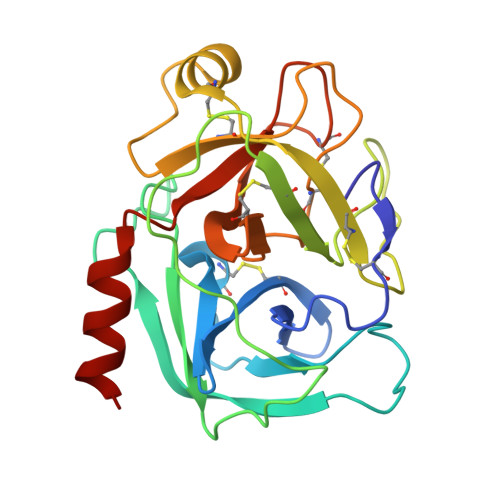Discovery of an autoinhibited conformation in mesotrypsin reveals a strategy for selective serine protease inhibition.
Coban, M., Gokara, M., Forero Vargas, L.M., Tanzer, S.D., Zhou, S.X., Hockla, A., Sankaran, B., Caulfield, T.R., Radisky, E.S.(2025) Sci Adv 11: eadu9129-eadu9129
- PubMed: 40614191
- DOI: https://doi.org/10.1126/sciadv.adu9129
- Primary Citation of Related Structures:
9BOS, 9BOT - PubMed Abstract:
Selective inhibition of the more than 100 S1 family serine proteases is a long-standing challenge due to their active site similarity. Mesotrypsin, implicated in cancer progression, exemplifies these difficulties; no current inhibitors achieve selectivity over other human trypsins. We found an unexpected autoinhibited conformation of mesotrypsin via x-ray crystallography, revealing a cryptic pocket adjacent to the active site. Using high-throughput virtual screening targeting this cryptic pocket, we identified a conformationally selective small-molecule inhibitor that stabilizes the inactive state of mesotrypsin. This inhibitor demonstrates selectivity for mesotrypsin over other trypsins. Our findings challenge the accepted view of digestive trypsins as constitutively active enzymes lacking potential for allosteric regulation. Furthermore, analyses of other structures suggest that dynamic sampling of closed states with analogous allosteric cryptic pockets appears widespread among S1 serine proteases. These observations point to a potentially generalizable strategy to achieve selective inhibition, offering broad implications for drug development targeting serine proteases in cancer and other diseases.
- Department of Cancer Biology, Mayo Clinic, Jacksonville, FL, USA.
Organizational Affiliation:



















